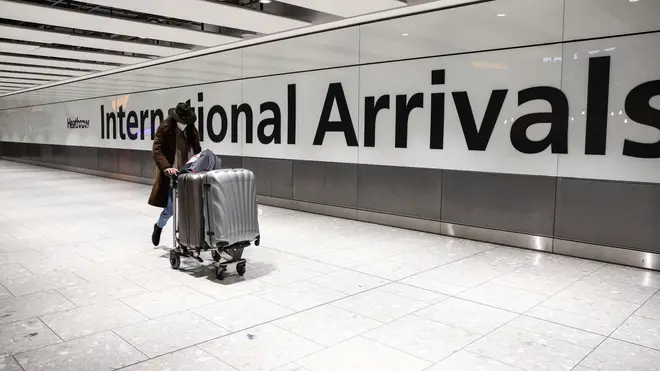
Richard Spurr 1am - 4am
4 February 2021, 06:14

International travel had the biggest impact on death rates for countries which were worst hit during the first wave of the coronavirus pandemic, a study has suggested.
Researchers from the University of Aberdeen examined a range of factors including border arrivals, population density, the percentage of people living in urban areas, age, average body mass index and smoking prevalence.
They found an increase of a million international arrivals was associated with a 3.4% rise in the mean daily increase in Covid-19 deaths during the first wave of the pandemic across the 37 worst-hit countries.
Tiberiu Pana, medical student and author of the study, said: "We found that international travel was the strongest predictor of mortality increase.
READ MORE: 'Why the delay?' - Labour questions quarantine hotel rollout time frame
"Another factor which appeared to play an important role was country-level BCG vaccination coverage, increases in which may be associated with decreases in death rates.
"Nevertheless, these associations were weaker and further work looking at individual patients is required to clarify these potential relationships.

Labour asks 'why the delay?" On partial quarantine
"Our assessment of available data indicates that very early restrictions on international travel might have made a difference in the spread of the pandemic in western Europe, including the UK.
"These findings are particularly important as the world looks to control future waves and strains of the Covid-19 pandemic and prevent related deaths."
The work focused on the early stages of the pandemic, using international travel data for 2018 as a proxy for 2020 data before international travel restrictions were imposed.
It comes as the discovery of the South Africa strain of coronavirus has prompted travel restrictions.
Most people arriving from anywhere outside the UK, Ireland, the Channel Islands or the Isle of Man must isolate at home for 10 days and provide a negative Covid-19 test result before they travel.

Covid fines issued as a group of 20 played football on locked pitch
The Government has been planning for a hotel quarantine system to come into place for people arriving from "red list" countries which have a higher rate of infection.
However, Labour has criticised the speed of these plans, and said all international arrivals must be quarantined in a hotel to reduce any new strains being imported into the country.
It also comes as scientists reportedly warned the Government weeks ago that only quarantine hotels for all arrivals or a total border shutdown would stop coronavirus variants from entering the country.
Prime Minister Boris Johnson outlined his plan last week for travellers coming from 30 "red list" countries to face up to 10 days in hotel self-isolation.
However the proposal was lighter than that advised by the Scientific Advisory Group for Emergencies (SAGE) a week before, according to The Times, and there is still no date for when it will be implemented.
READ MORE: Kent coronavirus mutation: What is the E484K strain and will it impact vaccine efficiency?
READ MORE: Door-to-door testing to root out 'every single case' of South Africa Covid variant
Shadow home secretary Nick Thomas Symonds and Mayor of London Sadiq Khan have been among those to attack the Government over its handling of the issue.
It comes amid concerns the more infectious South Africa variant is now spreading across England, with 80,000 people to be tested door-to-door in bid to find "every single case".